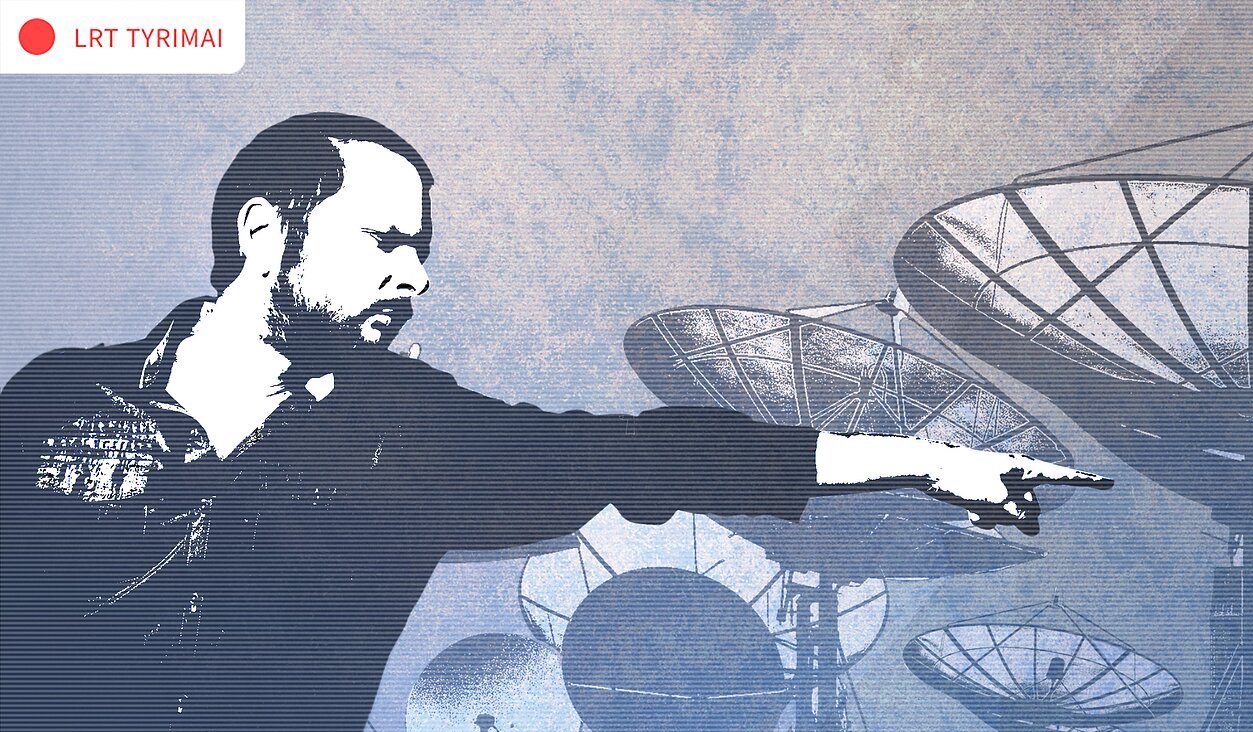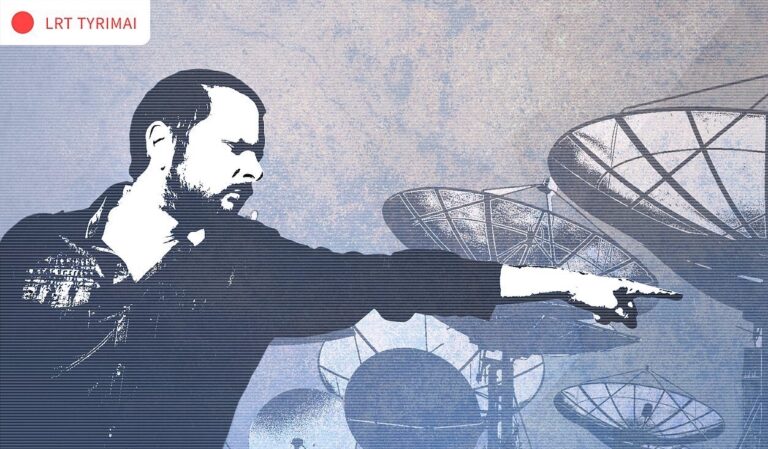After Russia’s full-scale invasion of Ukraine, a number of Russian spies operating under diplomatic cover have been expelled from Lithuania. The LRT Investigation Team, together with international partners, has analysed the Russian intelligence network in Europe, revealing the identities and activities of spies who operated in Lithuania for several years.
This article was originally published on www.lrt.lt
The Russian Embassy in Vilnius has until recently been known as a “training ground” for Russian intelligence officers. However, in April 2022, in response to Russia’s massacre in Ukraine’s Bucha, Lithuania sent away Russian ambassador Alexei Isakov and closed the Russian consulate in Klaipėda, which employed 14 people.
The reduced Russian diplomatic mission did not apply to the Lithuanian authorities for the renewal of the radio communications permit this year. The radio permit previously issued to the Russian Embassy expired in January 2023.
According to LRT’s sources, this could also mean a reduction in Russia’s intelligence work in Lithuania. Since the start of Russia’s war in Ukraine, five Russian diplomats, whose activities were incompatible with the status of a diplomat, have also been expelled from Lithuania. In other words, these individuals were spies for the Russian special services, working under diplomatic cover.
Since February 24, 2022, more than 400 Russian spies under diplomatic cover have been expelled from the EU countries. Most of them work for Russia’s three main intelligence agencies: the Foreign Intelligence Service (SVR), the Federal Security Service (FSB), and the Main Directorate of the General Staff of the Armed Forces (GRU).
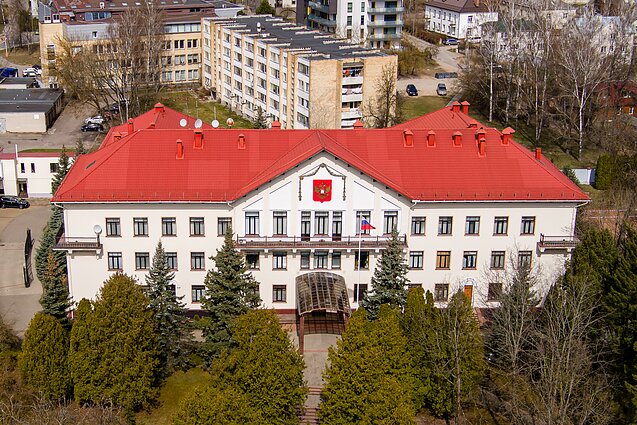
Russian Embassy in Vilnius / Fot. D. Umbrasas/LRT
Due to the specific nature and risks of counter-intelligence activities, Lithuania’s State Security Department (VSD) does not disclose the names of the Russian spies expelled from the country. It only notes that their targets were the parliament, the foreign and other ministries, the national defence system, municipalities, NGOs, the academic community, the media, the energy sector, as well as foreign diplomatic missions.
“The expelled Russian intelligence officers were conducting covert intelligence in Lithuania. Using the cover of diplomats, they recruited Lithuanians who could provide political, economic, and military information, sought to influence Lithuania’s political decisions in a direction favourable to Russia, or provided support for operations carried out by other intelligence officers,” VSD said in a written response.
However, the LRT Investigation Team, in cooperation with colleagues from European media outlets and the Dossier Centre for Investigative Journalism, identified the identities of the Russian Embassy employees involved in intelligence activities in Lithuania. The testimonies of politicians and former diplomats have also revealed how Russian spies gather information and recruit key figures.
Suspicious addresses
In 2020, when Žygimantas Pavilionis was appointed chairman of the Parliamentary Committee on Foreign Affairs, he decided to give a chance to the Russian Ambassador Isakov. The consensus was that the Russian, who had many years of diplomatic experience, was willing to engage with the West.
But when Isakov visited the Seimas, it became clear that the range of diplomatic tools in the talks with Russia was running low.
“I was appalled by the ambassador, by his uncompromising and bellicose rhetoric. Next to the ambassador sat two young subordinates. It seemed that every word and movement of the ambassador were controlled,” Pavilionis recalled.
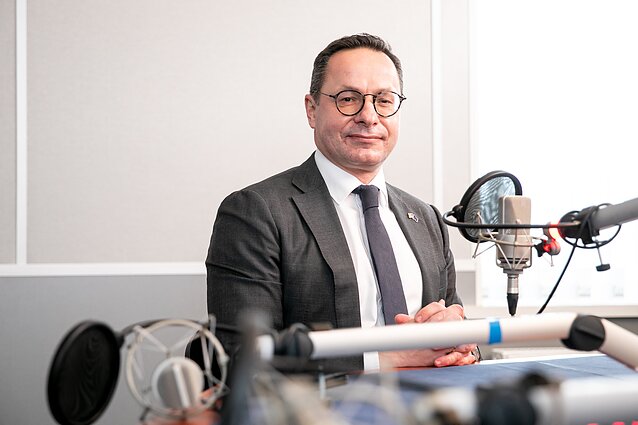
Žygimantas Pavilionis / D. Umbrasas/LRT
Pavilionis said he had suspicions that the two men were intelligence officers under a diplomatic cover. However, the biographies of Aleksandr Jolkin and Andrei Druzhilovsky do not show any obvious links to the Russian intelligence services but rather support from influential parents. Druzhilovsky’s father was at one time on the board of the MGIMO (Moscow Institute of International Relations) Foundation, a financial aid arm of the Russian Foreign Ministry. Meanwhile, Jolkin’s father worked at the Russian Embassy in the US.
Jolkin is currently serving as Chargé d’Affaires at the Russian Embassy in Lithuania. According to data gathered by the LRT Investigation Team, the five persons who were expelled by Lithuania as Russian spies working under diplomatic cover may be Sergei Zhurbin, Oleg Davletzianov, Dmitry Dolomanov, Ivan Fedotov, and Yuri Sarychev. The latter was expelled from Lithuania at the very end of 2022.
At first sight, there is nothing suspicious in the biography of Sarychev, who was born in Grozny in 1958. Having graduated from the Grozny State Oil Technical University, he worked in the Russian banking sector after the collapse of the Soviet Union. In 2000, he joined the Foreign Exchange and Finance Department of the Russian Foreign Ministry. According to Russian intelligence experts, this department usually employs Russian SVR and GRU agents.
Dolomanov also worked in the same department of the Russian Foreign Ministry as Sarychev. He was registered in Russia at an address in Mytishchi, where the GRU military base – a special-purpose radio centre – is located. Dolomanov joined the Russian Foreign Ministry in 2000 when he was still registered in the same military town.
According to LRT’s sources, a former employee of the closed Russian consulate in Klaipėda may also have links to Russian intelligence institutions.
According to databases, Aleksandr Tulynin (born in 1963) has given as his place of residence the address of the Yevgeny Primakov Institute for World Economy and International Relations in Moscow. Primakov was head of the Russian Foreign Intelligence Service from 1991 to 1996.
How spies work
Dmitry Remorenko, a former employee of the Russian Embassy, left Lithuania in 2019. He managed to become a member of the hockey club Tauras and was in contact with Jaroslav Narkevič, a former MP of the Electoral Action of Poles in Lithuania – Christian Families Alliance, later appointed Transport and Communications Minister in the government of Saulius Skvernelis.
Narkevič said he does not remember Remorenko but he knew that he was of interest to Russian intelligence.
“I will not hide the fact that throughout my entire political career, I was sensitive to such issues. We talked with VSD about what the risks were. I was quite cautious. I don’t remember any communication, and I would certainly remember if there had been any. Those diplomats are communicative people, that’s their job,” Narkevič told the LRT Investigation Team.
However, Remorenko had to leave Lithuania because of an obnoxious attempt to establish contact with Romas Švedas, a former diplomat who left the public sector to teach at Vilnius University’s Institute of International Relations and Political Science (TSPMI). At the time, Švedas was also Chairman of the Board of Lithuanian Railways.
“He was even aggressive, I would say. He would barge into the auditorium after lectures at TSPMI or as if accidentally meet me on the way out of them. He carried all kinds of documents and demanded that I explain what this or that number meant or a quotation of our foreign minister,” Švedas said.
VSD even published a photo of Remorenko, which is something intelligence agencies rarely do. According to LRT partners’ databases, a GRU spy was operating under diplomatic cover in Lithuania.
In general, Russian intelligence uses a variety of methods to get close to a person of interest.
“In Geneva, I was constantly receiving attention, invitations to visit, other communication initiatives from Konstantin Shakhmuratov, a long-time employee of the Russian foreign affairs system. Later, when I went to work in Brussels, he found me there again, as if accidentally,” said Švedas, who worked at the Foreign Ministry for many years.
MP Dovilė Šakalienė, a member of the Committee on National Security and Defence, also spoke about her encounters with Russian intelligence officers posing as diplomats. When she was working at the Centre for Human Rights, the Russian Embassy staff offered to support some of the centre’s activities.
“The Russian Embassy at that time was targeting NGOs, especially in the field of human rights. When they offered to support our centre’s projects, they also asked for information – they were interested in the lists of Belarusian students studying at the European Humanities University (EHU) in Vilnius and asked if we were in contact with Belarusian NGOs,” Šakalienė said.
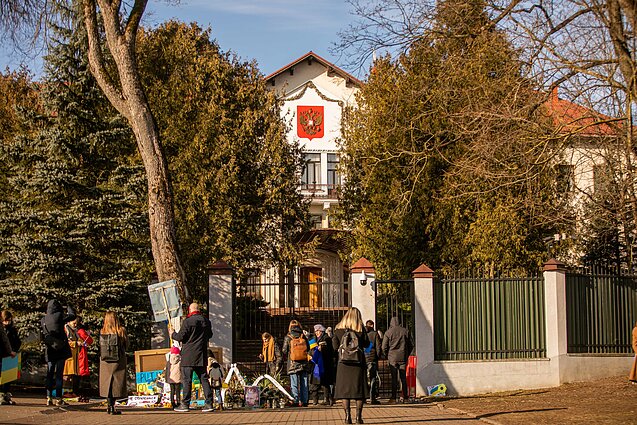
Russian Embassy in Vilnius / E. Blaževič/LRT
Mysterious disappearance
According to VSD, between 2018 and 2023, 11 Russian diplomats were expelled from Lithuania for activities incompatible with their status as diplomats. In the years leading up to 2018, there were only five such cases.
Former high-ranking politicians noted that the number of spies expelled did not reflect the actual Russian intelligence capabilities in Lithuania. The decisions to expel identified Russian spies were complicated by the fact that Moscow always retaliated by reducing Lithuania’s diplomatic representation.
According to the information gathered by the LRT Investigation Team, two spies operating under diplomatic cover – Viacheslav Parfionov and Fyodor Naumkin – were expelled from Lithuania in 2021.
Naumkin served as the Second Secretary at the Russian Embassy in Lithuania. He entered the address of his residence when registering his car in 2019. The LRT partners were able to identify this address as the location of the 4th training company of GRU in Russia, which runs a final training course for intelligence officers.
In 2019, Naumkin likely replaced other intelligence officers – Dmitry Masiuk and Alexei Muratov – who were not expelled by Lithuania but mysteriously disappeared before the end of their scheduled term of office. Unofficially, this may mean that the Russian side was alerted about the Lithuanian authority’s knowledge of the nature of these individuals’ activities.
Masiuk served as an advisor at the Russian Embassy in Lithuania and previously worked at the Foreign Currency and Finance Department of the Russian Foreign Ministry. Upon his return from Lithuania in 2019, Masiuk was appointed Deputy Director of the Commonwealth of Independent States (CIS) Department.
Data on Muratov, who worked as a Third Secretary at the Russian Embassy in Lithuania, is fully classified.
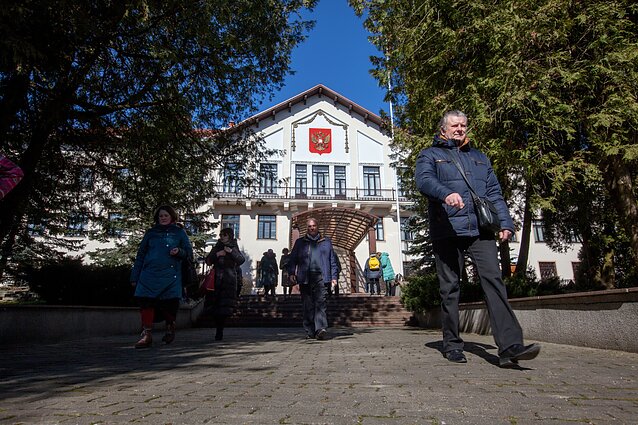
Russian Embassy in Vilnius / BNS
According to LRT’s sources, Russian intelligence services usually have their officers in embassies to monitor the activities of the spies and their family members. Their job is to make sure that the spies have not become close to the intelligence services of hostile countries or inadvertently given away their activities. If there is a threat that intelligence officers may be identified, they are immediately sent away.
KGB archives in Russia
Russian intelligence officers working under diplomatic cover gather information by attending embassy and other receptions, public events, and meetings. They observe selected individuals, taking an interest in their hobbies, family, and weaknesses, and draw up their comprehensive psychological portraits.
According to LRT’s sources, each Lithuanian diplomat has their own binder containing a detailed dossier. This dossier follows the diplomat’s appointments and is kept at the respective Russian embassy.
Once the conditions for contact are created, the aim is to recruit the person, to get them to work for a foreign country, either for money, through blackmail, or out of ideology.
The sources stressed that although Lithuania is a small country, experienced intelligence officers are assigned to spy in the country and on Lithuanians abroad.
But according to counter-intelligence experts, it is difficult for spies under diplomatic cover to operate in Lithuania, where there is little chance of going undetected. VSD is also almost always aware of whether a diplomat sent to Lithuania has intelligence assignments.
Since Russian intelligence is restricted in Lithuania, it targets Lithuanian diplomats, officials, and other key figures in foreign countries.
Also, files of KGB agents that have not been destroyed and were taken to Russia in 1989-1990 are used for blackmail. According to historians, the Lithuanian Special Archive has only 68 work or personal files, as well as several dozen files containing codified agent reports and files on candidates to become agents.
Asked to assess Russia’s intelligence capabilities, VSD said that the biggest counter-intelligence threat to Lithuania comes not from Russian spies working under diplomatic cover but from “intelligence from the territory” by Russia and Belarus.
“As part of ‘intelligence from the territory’, the Russian and Belarusian intelligence services recruit Lithuanian citizens travelling to their territory, send Russian and Belarusian citizens cooperating with the intelligence services to Lithuania to carry out intelligence tasks, and, in some cases, temporarily deploy intelligence officers with various non-diplomatic covers to Lithuanian territory to carry out intelligence tasks,” VSD said in a written response.
According to experts interviewed by the LRT Investigation Team, after losing the diplomatic cover, Russian intelligence is looking for new avenues. Across Europe, the opposition that has defected from Russia is being targeted by the intelligence services, and every effort is being made to expose the weaknesses of the Western intelligence services.
The Dossier Centre for Investigative Journalism and a number of intelligence and counter-intelligence experts, who spoke on a condition of anonymity have made important contributions to this international investigation.
Read also: Russian Diplomatic Facilities Serve as SIGINT Nests in Europe
The text was written as part of ESPIOMATS, a cross-border collaboration with:
Holger Roonemaa (Delfi – Estonia)
Lars Bové, Raphael Cockx (De Tijd – Belgium)
Mattias Carlsson (Expressen – Sweden)
Anastasiia Morozova (Frontstory – Poland)
Tomas Madlenak, (Lukas Diko / ICJK – Slovakia)
Indre Makaraityte (LRT – Lithuania)
Anna Gielewska, Szabolcs Panyi (VSquare – Central European outlet)
Dossier Center (United Kingdom)

